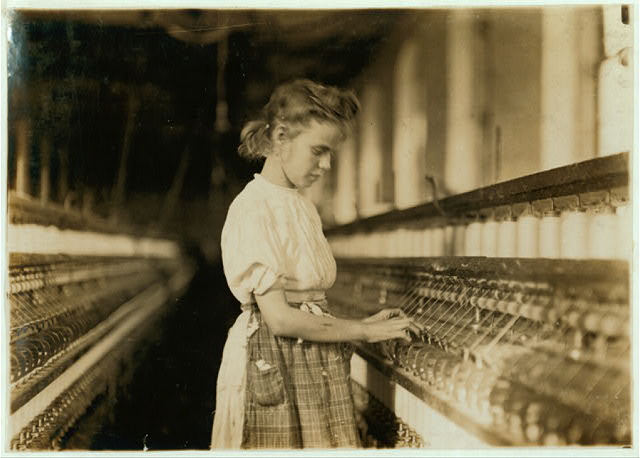“Child Labor day will be observed in the churches and Sunday schools today throughout the United States,” The Sunday Citizen reported on Jan. 23, 1916. Similar observations were scheduled for the following day at schools and social clubs. The events aimed to show solidarity for a recent bill sponsored by U.S. Reps. Edward Keating of Colorado and Robert Latham Owen of Oklahoma. “It is pointed out that if the Keating-Owen federal child labor bill … becomes a law, over 150,000 children will be freed from the mills and workshops,” the paper stated.
Though a national issue, Asheville residents held a keen interest in the matter. That February, the city was slated to host the 12th annual National Child Labor conference inside the Battery Park Hotel. Along with presentations and informal discussions, the four-day gathering was to feature Lewis W. Hine‘s photo exhibit “The High Cost of Child Labor.” At the time, North Carolina law permitted industries to employ 12-year-olds to work up to 11 hours a day.
The week before delegates were set to arrive, Rep. James J. Britt, who served the 10th district of North Carolina, shocked local constituents when he opposed the child labor bill on the floor of the House. Britt argued that Congress did not have the constitutional authority to pass a measure that imposed on states’ rights. If passed, Britt declared, “all hope of preserving the historical balance between the states and the nation will have vanished like an evanescent dream.”
In a Jan. 28, 1916, editorial, The Asheville Citizen condemned Britt’s stance. “Evidently the congressman from the Tenth district … has changed his mind and views on this question since reaching the national capital,” the piece read.
In the following day’s paper, in a letter to the editor, Hendersonville resident Zebulon A. Shipman praised The Asheville Citizen’s rebuke of Britt’s speech. Describing Washington lawmakers as “fifth-class lawyers,” handpicked by mill owners, Shipman wrote, “I am glad to know we have at least one editor of a daily newspaper who has backbone enough to come out in an editorial and defend the rights of the poor laboring children of our Southland.”
On Feb. 2, the day before the national convention commenced in Asheville, Congress voted in favor of the Keating-Owen bill, 337-46. Few, however, believed the Senate would pass the bill.
The National Child Labor conference began the following day. In an editorial, the paper celebrated the organization’s arrival, applauding its efforts “to save American childhood.” The piece declared, “The great bulk of American citizenship — that portion of it which is not blinded by self-interest and a desire for gain — knows and realizes that the curse of child labor is wasting away our youth.” Robbing children of their energy in the name of profit, the editorial argued that these industries were creating a future army “of half-made men unfitted for full service by the abuses heaped upon them in their earlier year.”
Not shying away from controversial figures, the conference included a talk by Britt, who again argued that the recently approved bill was unconstitutional. Keating also spoke during the four-day event.
“It is generally agreed that no convention that has visited Asheville in many years attracted such widespread attention as the convention of the National Child Labor committee which closed here Sunday,” The Asheville Citizen proclaimed on Feb. 8, 1916.
Despite the event’s success, the editorial held a bleak outlook for the future of the Keating-Owen bill. “[T]he measure will be slowly done to death by delays and postponements,” the paper predicted. “The senate in past years has never been in a hurry to aid the children of the mills and factories[.]”
“But why?” the editorial asked its readers, before offering its take:
“Because a few interests demand it, and the South through these interests would have us believe that it cannot compete with northern and eastern commerce unless it continues to offer up childhood on the altar of human greed. God help the children! Their friends are few.”
In a surprise twist (and at the urging of President Woodrow Wilson), the Senate voted in favor of the bill, 52-12, in August 1916. However, by September 1917, federal judge James E. Boyd of the Western District of North Carolina ruled the law unconstitutional in Hammer v. Dagenhart. Ultimately, in 1918, the Supreme Court sustained Boyd’s ruling.
Twenty years later, in 1938, the Fair Labor Standards Act established a national minimum wage of 25 cents an hour and a maximum workweek of 44 hours (reduced to 40 hours in 1940). The law also placed limitations on child labor, prohibiting youths 16 and younger from working in manufacturing and mining.
Editor’s note: Peculiarities of spelling and punctuation are preserved from original documents.




Before you comment
The comments section is here to provide a platform for civil dialogue on the issues we face together as a local community. Xpress is committed to offering this platform for all voices, but when the tone of the discussion gets nasty or strays off topic, we believe many people choose not to participate. Xpress editors are determined to moderate comments to ensure a constructive interchange is maintained. All comments judged not to be in keeping with the spirit of civil discourse will be removed and repeat violators will be banned. See here for our terms of service. Thank you for being part of this effort to promote respectful discussion.